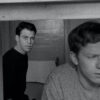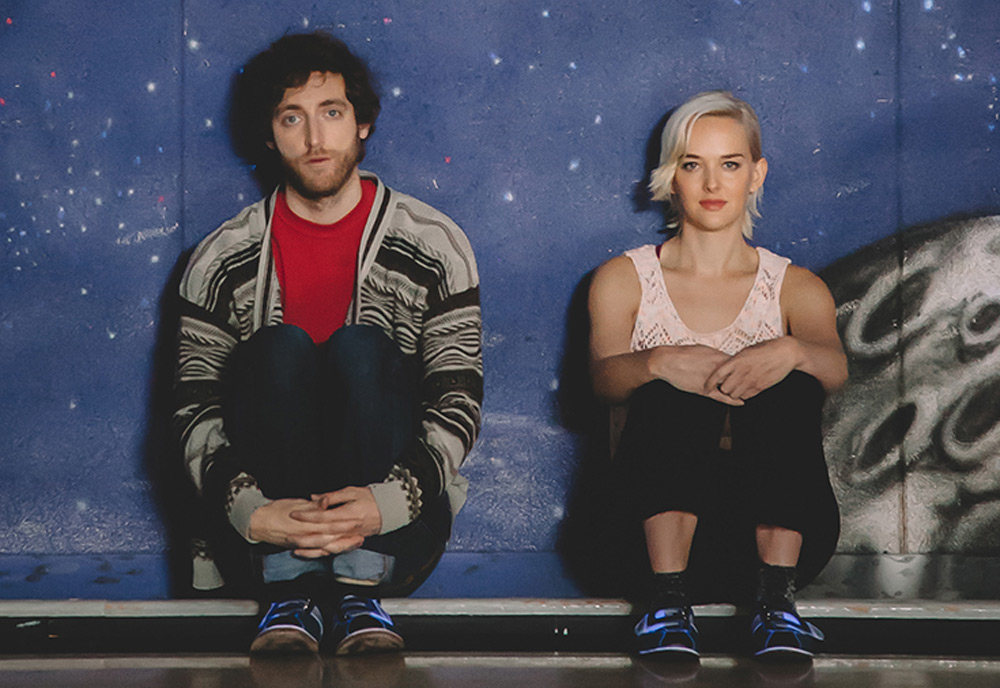“I guess I’m drawn to stories that maybe you don’t see all the time in a cineplex and issues and ideas that don’t get talked about enough,” Jason James said recently, with a hearty laugh when making the comparison between his mischievious directorial debut “That Burning Feeling” and his second feature “Entanglement,” which would only be considered sophomoric in terms of career chronology.
To understand James’ good humor, you’d have to know that “That Burning Feeling” playfully dealt with how the scourge of a sexually transmitted disease led a callous playboy (played by a debonair Paulo Costanzo) to reconsider how he treated others as he informs a series of one-night stands of the illness he may have spread while “Entanglement” delicately observes the mental well-being of Ben (Thomas Middleditch), who has a precarious hold on reality even before he learns he may have a sister named Hanna (Jess Weixler) well into his twenties. But while the two films may have some distance between them tonally, James shows in both that he has a light touch when it comes to taking subjects that people would rather not discuss and bring them closer to audiences so as to make them undeniable.
No doubt that’s why James became so enamored of Jason Filiatrault’s beautiful screenplay for “Entanglement,” inspired by the screenwriter’s own experience of his parents’ informing him that they had almost adopted a sister for him. Getting inside the head of Ben is no easy task, as he’s introduced on the verge of suicide, though in pricking his finger with a knife and thinking it’s too much, you suspect he won’t be successful. Still, he’s deeply unhappy, trying in vain to make a breakthrough with the (child) psychologist he’s seeing or with the study of quantum physics he’s undertaken that lead him to consider parallel universes he can get lost in without having to deal with what’s right in front of him. But the choice to engage with the world comes to him rather than the other way around when he’s sought out by Hanna, who thrusts herself into his life with the appeal of a bond that only they share yet a past that remains elusive, and his neighbor Tabby (Diana Bang), who challenges him because she knows him so well, making it impossible for him to ponder all the “what ifs” that he’ll use to withdraw into his own mind.
James, armed with a brilliant performance from Middleditch, makes Ben’s inner life hard to resist, full of fanciful stylistic flourishes as you see how comfortable Ben feels with Hanna, projecting onto her all he wants from himself in everything he doesn’t know about her, but when brought back to reality, the realization sets in of how unhealthy their relationship is and you realize while “Entanglement” could be considered a romcom, it is every bit a tale about falling in love with yourself as it is about connecting with someone else. Following the film’s premiere last year at the Seattle Film Festival, “Entanglement” hits theaters and VOD this week and the director hopped on the phone to talk about how both he and Filiatrault invested themselves personally into the film, figuring out how to make Ben’s fragile mental state so tangible to audiences and how he kept his head above water during some particularly tricky days of filming.

Yeah, Jason and I were developing something with another writer that never really went anywhere and then one day he just sent me this script and said, “I’d love to hear your thoughts.” He was just looking for some notes and as soon as I put it down, I could just see the entire movie very clearly. I actually created a Tumblr site [with] images and music and videos of how I saw the film and how I’d execute it, and I had never pitched a writer so hard to let me direct a movie. I had another film that was doing the festival circuit at that time and [when] it played in Calgary where Jason is from, I took him out for dinner and he finally agreed to let me come onboard. Personally, it came across my desk when I was about 35 years old and my mother had just told me who my real father was, so it was this really interesting time of questioning [for me of] who we are, where we come from and our place in the world [that’s] near some of Ben’s questions in the film. Perhaps that’s why I was so effusive about it that I needed to make it, but beyond that, it was just a really beautiful, odd, fantastical film that I just wanted to be a part of.
How did you see this film aesthetically?
The first word that came to my mind was “vinyl.” I wanted this film to have a handmade, kind of rough, decaying quality to it, and there’s a lot of visual effects in this film, so I went around and met with all the VFX companies in town and their job is to make the unreal seem real and really slick and sexy. [They] make spaceships and blow things up and I wanted the things in this movie that felt unreal to feel unreal. I wanted them to feel weird or awkward or handdrawn, to bump up against the reality of the scene or the world, so that was difficult to find a company that would make these weird Claymation things and puppets. Like when you see the fireworks in this movie, they look like a Windows ’95 screensaver, so that was my initial instinct was to make it feel handmade.
You’ve also said that the shooting style sort of corresponded to the character you were following at the time – the women in Ben’s life, you shoot them differently – how did you figure out how to enter through perspective in that sense?
Yeah, that’s the other thing I loved about this movie. It’s so much about Ben’s perspective and his lens on the world, so it’s really freeing as a filmmaker to be able to play with the real and the fantasy. And it’s a love triangle at its roots – Ben in the middle with Hannah and Tabby at both ends of the spectrum and Tabby represents control and Hannah represents chaos, so whenever one of those people is in a scene, the cinematic construction would change. Whenever Tabby’s in a scene, the camera is a little bit more fluid and steady and whenever Hannah’s in a scene, it gets a lot more lens-flare-y and the camera’s a bit more handheld. It’s that balance within us. All of us are constantly trying to balance this idea of chaos and control, so that was the jumping off point for how we shoot what’s going on.

Yeah, it’s such a filmmaker/writerly conceit to have a character that’s seeing and hearing things [that may not be there] and to me, it’s like okay, that’s all fine and good, but what’s the real-world version of this? What’s the most honest portrayal of what Ben is going through? So I have a friend who’s a psychiatrist and I got her to read the script and diagnose the character. He’s a schizoaffective disorder bipolar subtype and we talked a lot about what her patients mentally would be experiencing and what physical traits they may have. In the movie, Ben goes off of his pills, so we also talked a lot about what drugs [people with those diagnoses] are on and the side effects of those drugs. She gave us a lot of really interesting [facts about the] tics and traits and tells that I passed onto Thomas in some of our meetings. For me, it was just about trying to depict this illness in the most real way.
In general, what was it like working with Thomas on this?
One of the things I’m most proud of with this movie is Thomas’ performance. I think it’s a side of him that maybe we haven’t seen before and it’s really this honest, very grounded, dramatic performance that is quite lovely. Thomas was one of the first actors that we sent the script out to and the movie all came in around him being a part of it, so he was involved early on and he and I did a lot of rewrites. Te original script was more comedy comedy and I think a lot of the weird cerebral humor or drama is where Thomas’ instincts went. He also holds such a high bar. He really wants to be really, really great, as we all do, so we were constantly working the material, even moments before we step on set – we’re rewriting lines, moving things around and just beating up the script, as it were, which is a part of his process that I really enjoyed.
One of the cool things you do in the film is convey Ben’s instability through sound, both with certain anachronisms in the song selection and certain destabilizing qualities in the sound mix – how did you go about that?
Yeah, I’m a huge sound and music nerd and sonically approaching a lot of that stuff was really fun to play with — sounds coming in and out of the real world versus Ben’s internal world. The score is so much about the emotional arc of the character and the needle drop stuff was an interesting choice in that it’s all retro oldies music. Originally, I placed all very contemporary indie pop songs in the movie and it just felt so mediocre, like we’ve seen that before, so it took us a few weeks to think about it. I asked the music supervisor to send me a bunch of old, rare B-side songs, maybe [some that] weren’t properly recorded that [were] almost decaying in a way and it felt like it was coming more from a place of character rather than cool music.

I’ve never shot a lot of underwater photography before and if you watch the movie, there’s three different sequences that have underwater photography, so we had budgeted about half a day to shoot that stuff. I decided to storyboard it all out and I had about 16 shots storyboarded and [when] we started working away on the first shot, it took us about two hours. I’m not great at math, but two hours times 16 shots is a lot more than half a day’s work, so we just started hustling. [laughs] I had a radio with a one-way speaker under the water that I could talk to the actors and I’d just be yelling at the cameraperson and at the actors to “Swim here or look there! Or go up here!” It was a little bit crazy and hectic and we got this swimming pool at about four or five in the morning, so it was in the middle of the night, trying to herd everybody and shoot something underwater where you know things are a little unwieldy. But I will say that Thomas is some sort of gold, certified scuba diver and can hold his breath for an insane amount of time, so that really saved us. [laughs] It was inhuman how he could hold his breath for.
What’s it been like to share this with audiences?
It’s been really interesting. The film tackles issues of mental illness and depression and loneliness and all of us have been touched in some way, whether it be personally through a family member or a loved one. We’ve all experienced mental illness in our lives and I’m just amazed at how open and honest people are about that.That’s a really important step and that conversation is where this film flows from.
“Entanglement” opens on February 9th in Los Angeles at the Monica Film Center and in New York at the Cinema Village, as well as on demand and on digital.




